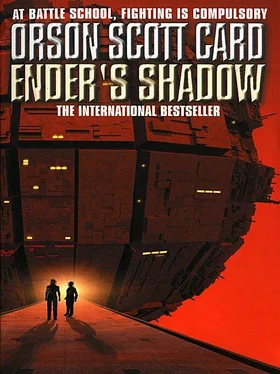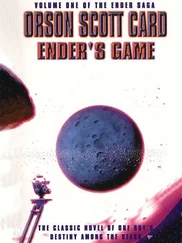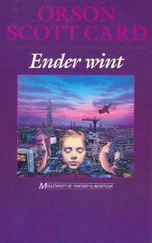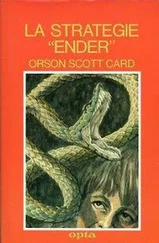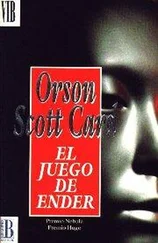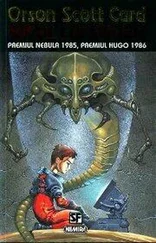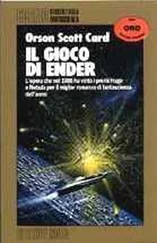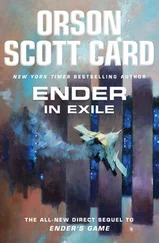Orson Card - Ender's Shadow
Здесь есть возможность читать онлайн «Orson Card - Ender's Shadow» весь текст электронной книги совершенно бесплатно (целиком полную версию без сокращений). В некоторых случаях можно слушать аудио, скачать через торрент в формате fb2 и присутствует краткое содержание. Жанр: Фантастика и фэнтези, на английском языке. Описание произведения, (предисловие) а так же отзывы посетителей доступны на портале библиотеки ЛибКат.
- Название:Ender's Shadow
- Автор:
- Жанр:
- Год:неизвестен
- ISBN:нет данных
- Рейтинг книги:4 / 5. Голосов: 1
-
Избранное:Добавить в избранное
- Отзывы:
-
Ваша оценка:
- 80
- 1
- 2
- 3
- 4
- 5
Ender's Shadow: краткое содержание, описание и аннотация
Предлагаем к чтению аннотацию, описание, краткое содержание или предисловие (зависит от того, что написал сам автор книги «Ender's Shadow»). Если вы не нашли необходимую информацию о книге — напишите в комментариях, мы постараемся отыскать её.
Ender's Shadow — читать онлайн бесплатно полную книгу (весь текст) целиком
Ниже представлен текст книги, разбитый по страницам. Система сохранения места последней прочитанной страницы, позволяет с удобством читать онлайн бесплатно книгу «Ender's Shadow», без необходимости каждый раз заново искать на чём Вы остановились. Поставьте закладку, и сможете в любой момент перейти на страницу, на которой закончили чтение.
Интервал:
Закладка:
"So you've got him analyzed already, is that it? You know what he's doing at all times?"
"I know that if there's a story we really want him to believe, he has to discover it himself. He has to steal it from us. So I think this little security breach is the perfect way to heal a much more important one."
"What I'm wondering is, if he's been crawling through the ducts, what else has he heard?"
"If we close off the duct system, he'll know he was caught, and then he won't trust what we set up for him to find."
"So I have to permit a child to crawl around through the ductwork and --"
"He can't do it much longer. He's growing, and the ducts are extremely shallow."
"That's not much comfort right now. And, unfortunately, we'll still have to kill Uphanad for knowing too much."
"Please assure me that you're joking."
"Yes, I'm joking. You'll have him as a student soon enough, Captain Uphanad. Watch him very carefully. Speak of him only with me. He's unpredictable and dangerous."
"Dangerous. Little Bean."
"He cleaned your clock, didn't he?"
"Yours too, sir, begging your pardon."
Bean worked his way through every student at Battle School, reading the records of a half dozen or so per day. Their original scores, he found, were the least interesting thing about them. Everyone here had such high scores on all the tests given back on Earth that the differences were almost trivial. Bean's own scores were the highest, and the gap between him and the next highest, Ender Wiggin, was wide -- as wide as the gap between Ender and the next child after him. But it was all relative. The difference between Ender and Bean amounted to half of a percentage point; most of the children clustered between 97 and 98 percent.
Of course, Bean knew what they could not know, that for him getting the highest possible score on the tests had been easy. He could have done more, he could have done better, but he had reached the boundary of what the test could discover. The gap between him and Ender was much wider than they supposed.
And yet ... in reading the records, Bean came to see that the scores were merely a guide to a child's potential. The teachers talked most about things like cleverness, insight, intuition; the ability to develop rapport, to outguess an opponent; the courage to act boldly, the caution to make certain before committing, the wisdom to know which course was the appropriate one. And in considering this, Bean realized that he was not necessarily any better at these things than the other students.
Ender Wiggin really did know things that Bean did not know. Bean might have thought to do as Wiggin did, arranging extra practices to make up for being with a commander who wouldn't train him. Bean even might have tried to bring in a few other students to train with him, since many things could not be done alone. But Wiggin had taken all comers, no matter how difficult it became to practice with so many in the battleroom, and according to the teachers' notes, he spent more time now training others than in working on his own technique. Of course, that was partly because he was no longer in Bonzo Madrid's army, so he got to take part in the regular practices. But he still kept working with the other kids, especially the eager launchies who wanted a head start before they were promoted into a regular army. Why?
Is he doing what I'm doing, studying the other students to prepare for a later war on Earth? Is he building some kind of network that reaches out into all the armies? Is he somehow mistraining them, so he can take advantage of their mistakes later?
From what Bean heard about Wiggin from the kids in his launch group who attended those practices, he came to realize that it was something else entirely. Wiggin seemed really to care about the other kids doing their best. Did he need so badly for them to like him? Because it was working, if that's what he was trying for. They worshiped him.
But there had to be more to it than some hunger for love. Bean couldn't get a handle on it.
He found that the teachers' observations, while helpful, didn't really help him get inside Wiggin's head. For one thing, they kept the psychological observations from the mind game somewhere else that Bean didn't have access to. For another, the teachers couldn't really get into Wiggin's mind because they simply didn't think at his level.
Bean did.
But Bean's project wasn't to analyze Wiggin out of scientific curiosity, or to compete with him, or even to understand him. It was to make himself into the kind of child that the teachers would trust, would rely on. Would regard as fully human. For that project, Wiggin was his teacher because Wiggin had already done what Bean needed to do.
And Wiggin had done it without being perfect. Without being, as far as Bean could tell, completely sane. Not that anyone was. But Wiggin's willingness to give up hours every day to training kids who could do nothing for him -- the more Bean thought about it, the less sense it made. Wiggin was not building a network of supporters. Unlike Bean, he didn't have a perfect memory, so Bean was quite sure Wiggin was not compiling a mental dossier on every other kid in Battle School. The kids he worked with were not the best, and were often the most fearful and dependent of the launchies and of the losers in the regular armies. They came to him because they thought being in the same room with the soldier who was leading in the standings might bring some luck to them. But why did Wiggin keep giving his time to them?
Why did Poke die for me?
That was the same question. Bean knew it. He found several books about ethics in the library and called them up on his desk to read. He soon discovered that the only theories that explained altruism were bogus. The stupidest was the old sociobiological explanation of uncles dying for nephews -- there were no blood ties in armies now, and people often died for strangers. Community theory was fine as far as it went -- it explained why communities all honored sacrificial heroes in their stories and rituals, but it still didn't explain the heroes themselves.
For that was what Bean saw in Wiggin. This was the hero at his root.
Wiggin really does not care as much about himself as he does about these other kids who aren't worth five minutes of his time.
And yet this may be the very trait that makes everyone focus on him. Maybe this is why in all those stories Sister Carlotta told him, Jesus always had a crowd around him.
Maybe this is why I'm so afraid of Wiggin. Because he's the alien, not me. He's the unintelligible one, the unpredictable one. He's the one who doesn't do things for sensible, predictable reasons. I'm going to survive, and once you know that, there's nothing more to know about me. Him, though, he could do anything.
The more he studied Wiggin, the more mysteries Bean uncovered. The more he determined to act like Wiggin until, at some point, he came to see the world as Wiggin saw it.
But even as he tracked Wiggin -- still from a distance -- what Bean could not let himself do was what the younger kids did, what Wiggin's disciples did. He could not call him Ender. Calling him by his last name kept him at a distance. A microscope's distance, anyway.
What did Wiggin study when he read on his own? Not the books of military history and strategy that Bean had blown through in a rush and was now rereading methodically, applying everything to both space combat and modem warfare on Earth. Wiggin did his share of reading, too, but when he went into the library he was just as likely to look at combat vids, and the ones he watched most often were of Bugger ships. Those and the clips of Mazer Rackham's strike force in the heroic battle that broke the back of the Second Invasion.
Читать дальшеИнтервал:
Закладка:
Похожие книги на «Ender's Shadow»
Представляем Вашему вниманию похожие книги на «Ender's Shadow» списком для выбора. Мы отобрали схожую по названию и смыслу литературу в надежде предоставить читателям больше вариантов отыскать новые, интересные, ещё непрочитанные произведения.
Обсуждение, отзывы о книге «Ender's Shadow» и просто собственные мнения читателей. Оставьте ваши комментарии, напишите, что Вы думаете о произведении, его смысле или главных героях. Укажите что конкретно понравилось, а что нет, и почему Вы так считаете.
